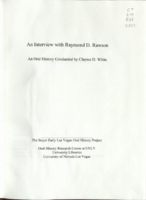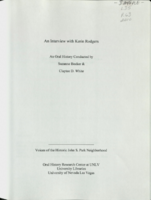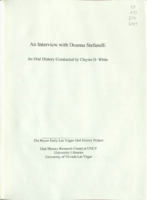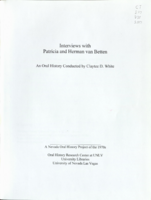Search the Special Collections and Archives Portal
Search Results

Transcript of interview with Suzie Chenin by Barbara Tabach, September 29, 2015
Date
Archival Collection
Description
In this interview, Suzie discusses growing up in Las Vegas, with a strong community of friends, particularly within Temple Beth Sholom. She also talks about her real estate career, both in residential and commercial properties, highlighting some of the successes and challenges. She describes her working relationship with Milton Schwartz, as well her time working with the Greenspuns while selling advertising at the Las Vegas Sun.
Suzie Chenin was born in Cleveland, Ohio, in August of 1949. The next year, her parents, Joseph and Irene Chenin, moved the family to Las Vegas. Her father, a dentist, was stationed at Nellis Air Force Base, becoming the first Jewish dentist in the state ? and only the thirtieth overall. After graduating from Las Vegas High School, Suzie attended Arizona State University. However, she quit school and moved to Los Angeles where she got a job with a large real estate developer. This was her first foray into the industry. A few years later, back in Las Vegas, Suzie got her real estate license, eventually starting her own brokerage firm, Chenin and Associates.
Text

Transcript of interview with Oscar Goodman by Claytee D. White November 10, 2014
Date
Archival Collection
Description
Oscar Baylin Goodman (1939- ) is the former mayor of the city of Las Vegas, Nevada, serving 12 years until 2011, when he swore in his wife of over 50 years, Carolyn Goodman. Oscar Goodman is the official ambassador of Las Vegas, and the chairman of the Las Vegas Convention and Visitors Authority (LVCVA) Host Committee. He is also known as one of the best criminal defense attorneys in the United States, and spent 35 years defending alleged Mob figures such as Meyer Lansky, Frank Rosenthal, and Anthony Spilotro. Goodman is the primary visionary and a member of the board of directors of The Mob Museum in downtown Las Vegas, which opened in 2012. Goodman was born June 26, 1939 in Philadelphia, Pennsylvania. He earned his undergraduate degree from Haverford College in 1961 and his law degree from the University of Pennsylvania Law School in 1964. That same year he moved to Las Vegas and in 1965 he was admitted to the Nevada State Bar. He served as Clark County?s chief deputy public defender from 1966 to 1967. Goodman was elected as mayor of Las Vegas for the first time in 1999. During his three terms (the legal limit), he contributed to the economic and cultural development of the downtown area by supporting projects such as the arts district and Union Park, a high-rise residential and business project he helped to secure 61 acres of land for. He helped to begin what he called the ?Manhattanization? of downtown, which included the construction of taller buildings for better use of the area?s prime real estate. In this interview, Goodman discusses the role of Judaism in his life, from childhood to adulthood to parenting his own four children. He touches on his involvement with Temple Beth Sholom, including serving as its president, as well as in local development projects like the Lou Ruvo Cleveland Clinic Brain Health Center, Smith Center for the Performing Arts, and Mob Museum. In addition, Goodman discusses the impact of Jewish residents on the city and its development, and mentions leaders in the gaming industry, legal profession and in politics.
Text

Transcript of roundtable interview with the Holocaust Resource Center: Myra Berkovits, Susan Dubin and Doug Unger, by Barbara Tabach, September 4, 2014
Date
Archival Collection
Description
Interview with Myra Berkovits, Susan Dubin and Doug Unger of the Holocaust Resource Center. In this interview, the group discusses the beginnings of what is now the Sperling Kronberg Mack Holocaust Resource Center. Edythe Katz-Yarchever is discussed as the catalyst for establishing the center and getting others involved with the Governor's Advisory Council on Education Relating to the Holocaust. Berkovits talks about her role as a liason for Holocaust education in the Clark County School District and the student-teacher conferences held each year with funding from Sheldon Adelson. Unger discusses expanding the outreach to the Washoe County School District with assistance from Atlantis Hotel (Reno, Nev.) owner, John Farahi and Judy Mack. They talk about the previous locations of the Holocaust Resource Center on Maryland Parkway, then Renaissance Drive, and the affiliation with the Jewish Federation and the Jewish Family Service Agency. After funding and personnel issues around 2011, the advisory council and the library went through a re-structuring and hired Susan Dubin who organized and catalogued the library collection. The library is now accredited by the Association of Jewish Libraries.
Text

Transcript of interview with Ethel S. Hatch by P. Kohlman, November 24, 1975
Date
Archival Collection
Description
On November 24, 1975, collector P. Kohlman interviewed housewife, Ethel S. Hatch (born April 11th, 1914 in Valentine, Texas) in her home in Las Vegas, Nevada. This interview covers the history of Las Vegas from 1939 to 1975. Mrs. Hatch also talks about ranching in Nevada, Rex Bell, development on the Strip, the first hotels, and early local shopping culture. She refers to Block Sixteen as Block Thirteen when discussing the Red Light District. The interview concludes with discussion surrounding tree-lined streets, the Helldorado Club, and Fremont Street.
Text

Transcript of interview with Murl Emery by James M. Greene, October 18, 1974
Date
Archival Collection
Description
On October 18, 1974, James M. Greene interviewed Murl Emery (born June 7th, 1903 in Bolton, California) at his home in Nelson, Nevada. Also present during the interview is Mrs. Emery and Mr. Dutch Eckhart, a guest who has just arrived to visit with Mr. Emery. The interview covers Mr. Emery’s personal experience in and around Southern Nevada, particularly in the areas from Searchlight, Nevada to Nelson, to Boulder Canyon, but mostly on the Colorado River. Mr. Eckhart also helps to interject some insight into the popularity of the Model T Ford in those days and early days of newly paved roads. Additionally, they discuss water shortage, wells, the building of the railroad, and mining in Nevada. Mr. Emery also discusses the books that were written about his adventurous life, his discoveries and his explorations.
Text

Transcript of interview with Dr. Ray and Linda Rawson by Claytee White, October 30, 2009 and November 13, 2009
Date
Archival Collection
Description
Raymond Rawson's life started in the rural Utah community of Sandy in 1940. His family moved around in what he describes as a scene from John Steinbeck's The Grapes of Wrath. By the age of 10, the family settled in Las Vegas, which had a population of around 35,000. He attended Fifth Street Grammar School, Las Vegas High School, was a member of UNLV's first graduating class, and eventually became a dentist. In this interview, he reflects on his experiences of growing up in Las Vegas, the hardships of difficult economic eras, and his professional accomplishments in the field of dentistry, including actively advocating the creation of UNLV School of Dental Medicine. Ray also became a community leader. He served in the Nevada State Legislature from 1985 to 2001. He talks about his relationship with long-time legislator Joe Neal. Education and access to healthcare were among the issues that Ray championed and he shares his observations of these issues. In 2009, he was appointe
Text

Transcript of interview with Kerin Scianna Rodgers by Suzanne Becker and Claytee D. White, February 7, 2009 and August 11 & 16, 2011
Date
Archival Collection
Description
Kerin Rodgers was born in 1936. She recounts her family history and stories of her youth growing up in Boston, MA, and shares how the family relocated to Seattle, WA in the mid-1940s. She talks about her enjoyment of theatrical arts and politics, and about being a resourceful divorced, single-mom and entrepreneur. In 1958 she opened a retail fashion store and modeling agency with a friend in Santa Monica, CA. Kerin had a knack for fashion and interior design that would assist her then and into the future. She also shares the story of arriving in Las Vegas as part of retail job with The Broadway stores in 1966—a two-week stint that seemed to have no ending. Her transition into Las Vegas included remarriage, a 1974 Keno win that enabled her to put down money on a home ( a house built by Paul Huffey) in the John S. Park neighborhood, and making close friends in the community. Her interview is sprinkled with tales of activities and personalities from the neighborhood's past and present. Kerin was involved with the Focus Youth House, speaks about First Fridays and art, as well as gives a perspective of police, criminal behaviors and changes in the neighborhood over the years. She hosted a local television show and enjoyed being a community activist.
Text

Transcript of interview with Deanna Stefanelli by Claytee White, May 3, 2010
Date
Archival Collection
Description
Deanna Stefanelli and her family moved to Las Vegas when her husband John Stefanelli accepted a position as a professor in Food and Beverage at UNLV. She took a part-time job in the admin office of the university's library in 1981. It was also an ideal time for her to return to college to finish her degree. Eventually she became full-time and enjoyed the growth and change of UNLV and the library. Deanna recalls the physical and personnel changes of the library. She describes some of the fun activities that kept them a close work community—from the Friends of the Library to book sales and pancake breakfasts, to a newsletter and learning to make sushi with Myoung-ja Kwon.
Text

Transcript of interview with Pat van Betten by Claytee White, February 6, 2007
Date
Archival Collection
Description
Patricia and Herman van Betten met in Pittsburg through their volunteer work on the John F. Kennedy Campaign. After their Connecticut wedding and Herman's studies at the University of Texas and the University of Southern California, they and three small children moved to Las Vegas. Their fourth child, a native Las Vegan, was born in 1968. In 1967, Herman acquired a position at the Nevada Southern University, which is now the University of Nevada, Las Vegas. Beginning in the 1970's the couple worked diligently to make the Las Vegas community a great place to live. They participated in The League of Women Voters, The Consumer League, the Welfare Rights Movement, and the Community of a Hundred. Patricia served as the President of the Consumer League and Herman was elected to the local school board. They were jointly appointed by the ACLU as Civil Librarians of the Year, 1990-1991. Currently retired, they engage in civic, environmental, and historical activism in the village of
Text

Transcript of interview with Dean Whitaker by Claytee White, April 5, 2010
Date
Archival Collection
Description
William Dean Whitaker was born in 1925 and raised in a suburb of Los Angeles, California. Dean, as he is known, talks briefly about his parents and his brothers, for his youth quickly ended when he joined the Air Force and became an aviation cadet once he had turned 18 years old. The year was 1943 and World War II was raging. He became a member of the 398 th Bomb Group and flew twenty missions before being captured by the Germans. In this oral history, Dean talks with vivid recollection of the day he was captured and details of being a POW in Germany. Among his anecdotes are those of his mother's unwavering belief that he would return home, the humanity of a German soldier, and of meeting Gen. George Patton. Included are photos and excerpts from his personal history of his life during the war. Dean and his wife Lucille moved to Las Vegas in 1990.
Text
